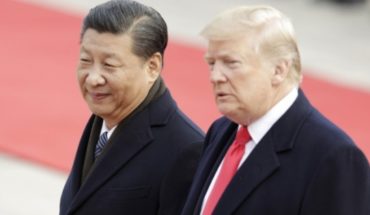Geography can be understood as the science that studies the relations between society and space, with the added value that geography starts from an integral vision from different fields, such as pedagogy, to bring into play global interpretations of the world, territorial planning, linked to recommendations and decision-making, as well as the integration of various interdisciplinary analytical approaches, to produce geographical synthesis.
Geography goes beyond the production of basic knowledge about the location and description of places and objects on the earth’s surface and its association with maps, advancing in its scientific character for the understanding and analysis of territorial dynamics. On these definitions it is relevant to have a geographer in La Moneda.
In the episode of Sunday, April 9, 2023 of the ‘Zero Tolerance’ program, Camila Vallejo, Minister Secretary General of Government put the ball on the floor, giving passes for the advancement of the team (powers of the State) and focused on dealing with situations of high complexity and uncertainty such as the dimensions of organized crime within the framework of the security agenda. Governing with the reality we have, processing crisis cycles and the typology of accumulated unresolved conflicts is an imperative for this or any government in the future, especially from spaces, territories and platforms that encourage collaborative innovation.
The space occupied by organized crime in society is increasingly branching out into the lives of ordinary individuals and institutions. This complex phenomenon is not located in a “narco-house” or in a particular village or population, but in the accumulation of power provided by money laundering to float between the illicit economies originating in its productive chain and the licit economies of facades, geographically located by the urban space and the plots of pleasure in areas away from the hustle and bustle of the cities.
Organized crime is a war unleashed against democracy and the civilizational advances of societies. Likewise, we know that war – at any time in history – is an organized crime to establish a new regime or new rules of the game by force, obviously alien to any dialogical effort to transform society.
In this sense, it is a mistake to think that organized crime at the level of personnel and people only feeds on hitmen or soldiers, but mainly on professionals such as accountants, engineers, architects, doctors, teachers or cooks, because there are always accounts to take out and money to launder, systems to organize and redesign, houses to build, Shots to attend, children to educate or people to feed. The list of professions and functions at the service of organized crime, by the way, does not fit in this opinion column.
At the level of institutions, organized crime sneaks in where we already know that there is an absence of the State. Nothing new, but it is always necessary to update the list of institutions that are governed by organized crime and those that are threatened in their public or private function, be it a professional football corporation, a foundation with a diffuse mission, a municipality far from the hand of the State and its control systems, an educational establishment that represents a recreated brand or identity, An established store with a high influx of public, an agency of various services, available to finance electoral campaigns, real estate of dubious origin and capital, do we continue?
Faced with the question based on a misleading wedge or the liquid opinions of some authorities in government positions or gaseous behavior of political parties, the geographer minister responds by entering the complexity of what was consulted, an issue increasingly absent in the face of the disconcerting changing scenarios, where being left out of media populism is paid with insults, Dismissals, funas and misunderstandings of all kinds.
Entering into complexity is a pedagogical task, putting citizens into play in public affairs, not only to reaffirm/communicate the Government’s agenda on what has been done and what is in the process of management and concretions, but above all, to measure the size of the crisis that is being experienced in Chile in terms of security, whose cycle did not begin with the current administration of It made its debut since the time when Virgilio Barco (Colombian president) warned Patricio Aylwin, before starting the process of democratic transition in Chile, about the growing threat of organized crime and one of its most lucrative and sickening activities for any society such as drug trafficking and cartel action.
The dialogical aspect in the exercise of power also has to do with a substantive, procedural and psychological increase (communicational effect) in the design and implementation of interministerial public policies. This exercise of dialogic power should be a daily task of interdisciplinary and interministerial professional teams with SMART objectives (specific, measurable, achievable, realistic and in the right time), whose result and implementation has more to do with their media visibility and citizen reading with a speed race and balance of energy by teams than with a long and tiring solitary marathon that is diluted in the gestation process and is diminished. in its impact and social relevance.
At the beginning of the current government, at a meeting of ministers, the government spokeswoman proposed a cartography to promote interministerial public policies, given that no portfolio by itself is capable of responding to the overwhelming problems that they have to attend to by mission. This of governing alone should be passed in the management of governments in the twenty-first century, because the fastest growing industries are complexity and uncertainty.
It is demonstrated that, more than changes or replacements in the holders of government portfolios, collaborative innovations are required between ministers, but, above all, in the daily life of government action, we must expand the horizons of dialogic creativity and collaborative innovation of interministerial government teams. to enter the complexity, being producers of government plans, based on changing scenarios. Sound decisions are such when experiences, knowledge, learning, practices and values that point towards the common good are balanced.
On the design and implementation of interministerial public policies in the last 33 years we can investigate relative advances and failures when entering into complexity, to take into account – among other aspects – when and how simplism and linearity were installed in the exercise of power when addressing complicated, complex and chaotic matters. In this area that borders between the complicated, the complex and the chaotic, the sciences and technologies of government are of another nature and dimension. This is already the subject of another column and other conversations.
Follow us on
The content expressed in this opinion column is the sole responsibility of its author, and does not necessarily reflect the editorial line or position of El Mostrador.





